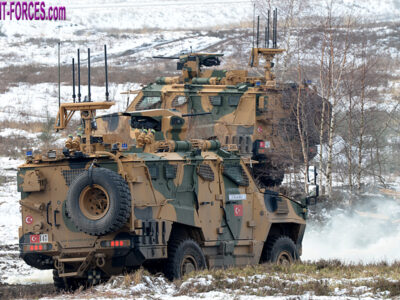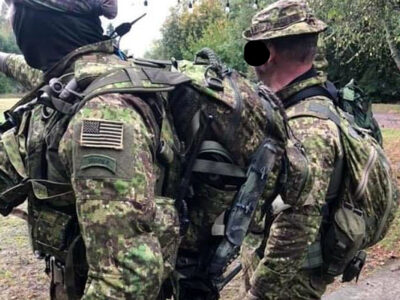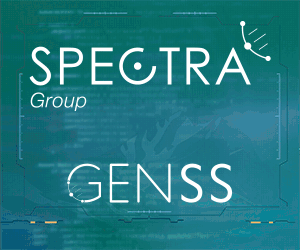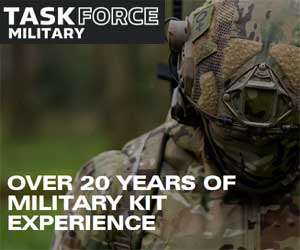
In 2025 the Irish Defence Force will provide the Mechanised Force Protection Company (MFPC) for the EUROCORPS multinational headquarters, reports Carl Schulze.
~
The EUROCORPS is a multinational corps-level headquarters for planning and commanding military operations of both the European Union and NATO. High Readiness Force (HRF) certified, it can be deployed ad hoc and intervene in and outside Europe in a wide range of missions at any level of intensity, ranging from crisis management, stabilisation and assistance up to full-scale high intensity war fighting.

In 2025 EUROCORPS will serve under the European Union’s Rapid Deployment Capacity (EU RDC) as Force Headquarters (FHQ) for the European Battle Group 2025 (EUBG 2025). Security for the EUROCORPS FHQ is ensured by the Mechanised Force Protection Company or MFPC. We recently visited the unit provided by the Irish Defence Force during the European Union Military Exercise 2024 (MilEx 24) held at the Bergen Training Area in northern Germany.

Like Austria, Cyprus and Malta the Republic of Ireland (Poblacht na hÉireann) is a member of the European Union, but not of the North Atlantic Treaty Organisation (NATO). Since 1999, however, the Republic of Ireland has been an active member of NATO’s Partnership for Peace (PfP) programme and has also signed up to NATO’s Euro-Atlantic Partnership Council (EAPC). This said the country still maintains a historic strict policy of neutrality in armed conflicts.


The main aim of the PfP membership of the Republic of Ireland is to increase the interoperability of the Irish Defence Force with the forces of NATO member states in order to allow seamless cooperation when both have to operate together during a Peace Support Operation under United Nation (UN) mandate. Since 1955 the Republic of Ireland has been a member of the UN, and as such it has supported many UN Peace Support Operations in that time. During many of these missions troops of the Irish Defence Force closely cooperated with those of NATO member nations.


Participation in the EUBG rotations therefore has to be seen as part of the Republic of Ireland’s broader commitment to international peacekeeping and crisis management. The country has in fact been a long-standing and active contributor to European Union Common Security and Defence Policy (CSDP) missions, for example Operation ARTEMIS, EUFOR Chad, EUFOR BiH, EUTMs Mali and Somalia, EUMAM Ukraine, as well as several Naval deployments to the Mediterranean under Op PONTUS/SOPHIA and most recently EUNAVOR MED in 2023.

The participation in the EUBG 2025 rotation is the Irish Defence Force’s eighth since the European Union decided to form the EU Battlegroups (EUBG) in July 2007 and these reached full operational capability in 2007. The Irish Defence Force have previously participated in the Nordic Battlegroups 2008, 2011 and 2015, the UK-led EUBG 2016 and the German-led EUBG 2012, 2016 and 2020.

IRCON: In the EUBG 2025 Force Package the Irish Defence Force are participating with 182 soldiers. While the bulk of these belong to the Mechanised Force Protection Company, this number also includes a platoon-size National Support Element (NSE) plus ten Officers and NCOs that serve in the EUROCORPS FHQ. The staff personnel are performing a variety of tasks, such as Intelligence, Operations, Training, Logistics, Strategic Communications and Political Advisor to the EUBG 2025 Force Commander.
The lead formation for the EUBG 2025 Force Package of the Irish Defence Force, also known as Irish Contingent (IRCON), is the Dublin based 2nd Brigade of the Irish Army. IRCON falls under command of the brigade while in Ireland. In the event of a deployment, IRCON comes under command of French Major General Geoffroy de Larouziere, the Deputy Commander (DCOM) of the EUROCORPS in Strasbourg.

IRCON consists of volunteers from across the Irish Army, with the 140 soldiers of the Mechanised Force Protection Company originating from all seven infantry battalions of its two brigades and the Defence Force Training Centre based at Kildare. Namely these infantry battalions are the 1st Infantry Battalion based at Galway, the 3rd Infantry Battalion based at Kilkenny and the 12th Infantry Battalion based at Limerick, all belonging to the 1st Brigade, as well as the 6th Infantry Battalion based at Athlone, the 7th Infantry Battalion based at Dublin, the 27th Infantry Battalion based at Dundalk and the 28th Infantry Battalion based at Donegal, all belonging to the 2nd Brigade.
IRCON was stood up on the 1st of January 2024 and will remain in the Stand-Up Phase until the end of 2024. The primary focus of this phase was to generate the contingent, establish cohesion and conduct mission tailored training. As part of the Stand-Up Phase the troops were put through a comprehensive training package conducted on several training areas in the Republic of Ireland, including for example public order, live firing, mechanised infantry tactics, urban warfare and counter improvised explosive device sessions. In September 2024 IRCON then had to master its National Certification Exercise. The Stand-Up Phase culminated in the participation and international certification of IRCON during the European Union Military Exercise 2024 (MilEx 24) held at the Bergen Training Area in northern Germany, conducted between 26th November and 9th December 2024.

During the exercise a EUROCORPS Forward Command Post was deployed to Bergen Training Area together with additional enablers. Security for the EUROCORPS Forward Command Post was provided by the Mechanised Force Protection Company. In addition the company went through a challenging live fire package conducted on the training area ranges.
The Stand-Up Phase will be followed by the Stand-By Phase, which begins on 1st January 2025. Throughout next year IRCON will then maintain full strength and be kept at a high state of readiness to deploy as part of the EUBG 2025. As part of the Stand-By Phase the timely deployment capabilities of the EUBG 2025, as well as its ability to be logistically self-sufficient for a 30-day-period, will be tested during the European Union Military Exercise 2025 – I (MilEx 25–I), which is scheduled to be conducted in Hungary in April 2025.
[images © Carl Schulze]
~





















Pingback : EUROCORPS Mechanised Force Protection Company ~ Part Two | Joint Forces News